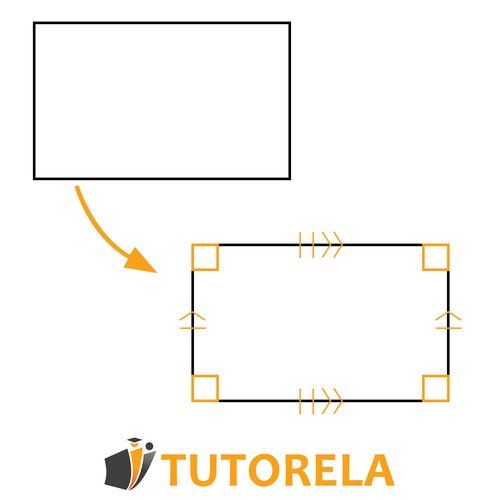How do we recognize that the quadrilateral in front of us is actually a rectangle?
In two quite simple ways!
Rectangle Proof Practice Problems - Quadrilateral to Rectangle
Master proving rectangles from quadrilaterals with step-by-step practice problems. Learn angle checks, parallelogram proofs, and diagonal properties.
- Prove rectangles using the 90-degree angle check method
- Apply the two-step parallelogram to rectangle proof technique
- Identify when three right angles guarantee a rectangle
- Use diagonal properties to prove parallelograms are rectangles
- Master all five methods for proving quadrilaterals are parallelograms
- Apply rectangle proof strategies to complex geometry problems
Understanding From a Quadrilateral to a Rectangle
First form: angle check
A rectangle is a quadrilateral whose angles are equal to degrees, if we can prove that this is also the case for our quadrilateral, we can prove that it is a rectangle.
Second form: parallelogram proof and then rectangle proof
This form is a bit more complicated, as it involves two steps.
So, why is it useful?
There are five ways to prove that a quadrilateral is a parallelogram, so many times (depending on the data) it will be easier to prove that the quadrilateral is a parallelogram.
Once we have been able to prove this, we can move on to the next step and prove why this parallelogram is a rectangle.
Remember, a rectangle is a special case of a parallelogram.

Practice From a Quadrilateral to a Rectangle
Given the quadrilateral ABCD so that
AD||BC , AB||CD
Indicate if the quadrilateral is a rectangle.
Examples with solutions for From a Quadrilateral to a Rectangle
ABCD is a square with sides measuring 4 cm.
Is ABCD a rectangle?
We know that the figure shows a square and that, in a square, every pair of opposite sides are parallel.
We also know that every pair of opposite sides in a rectangle are parallel as well.
Therefore, the quadrilateral ABCD is indeed a rectangle.
Answer:
Yes
Given the quadrilateral ABCD whereby
AD||BC , AB||CD
Indicate if the quadrilateral is a rectangle.
In a rectangle, it is known that all angles measure 90 degrees.
Since we know that angle B is equal to 100 degrees, the quadrilateral cannot be a rectangle.
Answer:
No
It is possible to draw a quadrilateral that is not a rectangle and that has two equal opposite sides?
Answer:
Yes.
It is possible to draw a quadrilateral that is not a rectangle, with the sum of its two adjacent angles equaling 180?
Answer:
Yes.
It is possible to have a rectangle with different angles?
Answer:
No